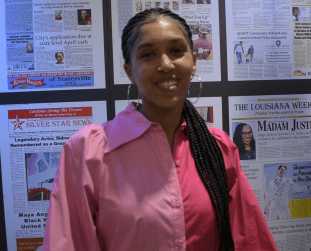As the latest “most important election of our lifetime” fast approaches this November, and voter suppression continues, many potential young voters express dissatisfaction with their options, apathy about voting as a vehicle of change and a lack of access to viable information.
Still, there are many Gen Zers and millennials who believe in the power of the ballot, but see hurdles that must be cleared in order for Black voting power to be maximized.

Melanie Mainor, copy editor and social media manager for the New Orleans Data News Weekly, spoke during the 2022 NNPA (National Newspaper Association) National Convention on the importance of getting millennials and Gen Zers to vote.
“We have an overarching attitude between the younger generations that voting is not important, that it does not make a difference,” said Mainor, herself a millennial. “Most of that is informed by seeing the lack of legislation that is tailored towards helping us.”
Mainor said many Blacks younger than Generation Xers (41-56) say, “I can vote all day, but whoever gets in the seat is not going to do anything for me.”
Lisa El-Amin, a 20-yr-old University of Houston junior, thinks low voter turnout from her peers is from a lack of interest in politics or misunderstandings about elections. Still, she’s a voting advocate.
“The youth have a lot of influence, especially in pushing towards change in our nation, so it’s vital that we’re educated on why voting matters,” said El-Amin. “The officials we elect affect our future and we make up a large number of eligible voters.”
El-Amin is not alone.
“Voting is a privilege, but voter suppression is a big issue that we still face in this country,” said Deja Crayton, a 20-yr-old junior at the University of Texas San Antonio.
“Voting in federal elections has always been a big deal, but we should also make sure to get involved in local elections as well, as they are just as important,” said Gen Z UH senior, Maisha Ayan Ali.
UH sophomore Anana Ada agrees.
“It’s our responsibility to go out and vote; not just vote for a candidate as a joke, but to vote intelligently and responsibly,” said Ada. “Our representatives have the power to change the world because we give them the power to do so. By neglecting to vote we help give power to politicians who don’t care about basic human rights. We give them power to then influence the election of other politicians who share their views. We give them the power to overturn landmark decisions such as Roe v. Wade.”
UH alumna Tammy G. thinks K-12 schools should teach about voting’s importance so children become voting adults.
“Because right now, we mainly hear about politics through mass media and from other people, so it’s not really a reliable source of knowledge,” she said.
Aware of national voter suppression efforts, longtime activist and current head of the NNPA, Dr. Ben Chavis told convention attendees, “The worst voter suppression is self-suppression—choosing not to vote.”
Mainor believes politicians and Black media must do better communicating with young voters.
“We have to reach them on social media. You have to incorporate your online presence in order to get the younger generations. And we need to be telling these stories from the point of history, from the point of legacy, but getting that importance to them, meeting them where they are.”
Mainor believes hiring more under 40 employees would help.
“It’s critical to have someone from the younger generation who understands how we speak to each other, how to post in a way that is impactful, how to make messages that get through. If you’re going to go to a Spanish-speaking country, you would bring a Spanish person with you. You want to talk to the young people, bring a young person with you.”











